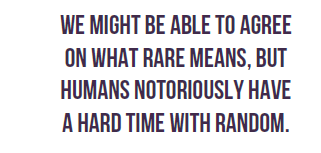When the jackpots are big enough, we see money pouring in. But ‘big enough’ keeps floating higher, and the number of players is not growing significantly. If we want to engage people to play more money more often, we need to give them better value. I discuss how to do that, in NASPL Insights April 2020.
Category: challenges
respond or fail
Random is hard
Humans have a hard time with the abstract concept of randomness, especially as applied to rare events. A truly random process distributes rare events less evenly than we intuitively expect. In the lottery world, this can lead to some players winning more than seems ‘reasonable’. This can lead people to mistrust the lottery. Mistrust is amplified if some players buy winning tickets at a discount, from players who do not wish to identify themselves to the lottery. Lotteries may need to act quietly to preserve public trust, as I discuss in the December 2018 NASPL Insights.
Betting Randomly on Sports: New Lottery Territory?
People are publicly passionate about sports, as about little else. Where they bet money on sports, the collision of passions and skill can support a big business. Lotteries, accustomed to running games of pure chance, face a steep learning curve if they get involved in sports betting. But there is potential to use a sporting event to determine the outcome of a game of pure chance- if the player bets randomly. How can lotteries develop this opportunity? I explore this question in NASPL Insights September 2018.
Risky Business – Time for Insurance?
Historically, state-sponsored lotteries have relied on the sheer volume of transactions, achieved through their monopoly status, to make the risk of paying big prizes reasonable. However, these advantages may be absent when a new game is started. Other businesses have developed risk-sharing mechanisms, including insurance against specific risks. ‘Synthetic’ lotteries like Lottoland have shown these can work in gaming. There maybe something to learn here, as I discuss in NASPL Insights August 2018.
The Age of Lotto
Are classic lottery games like Lotto evergreen– that is, will they continue to thrive indefinitely? This depends on whether the player population can be sustained into the future.There are two schools of thought about this: 1) Lotto play is something a player ages into; young people coming up will sustain it, and 2) Lotto play is a thing of the past; young people will not join. Looking at historical data from Washington, I show that age groups that now account for a significant share of spending played a lot less years ago. However, the low level of engagement of the youngest age classes is unprecedented. The analysis supports hope but certainly not complacency for the future of these games. NASPL Insights February 2018
Testing Lottery Advertising: Both Wins and Draws Count
How is grand-scale research on lottery advertising like grand-scale research in agriculture? No one does it, who must thrive or fail according to the outcome. With my friend Jade I discuss tests of smaller scale, and we agree that there is usually something to be learned from a well-constructed test of advertising, even if the results are not what everyone wanted. After all, don’t we want to know what not to do? NASPL Insights August 2017
Shouldn’t there be a measurement for that?
A lottery sales representative, Otto the Beer Guy, explained his view of the business to me. Since some Scratch tickets sell better than others, and it’s a good idea to make the most popular ones easiest to find. To help Otto, I developed a metric that compares games on their current popularity, making it easier for people to see which games may need more space. The metric is based on the retail standard of turn rate. NASPL Insights June 2017
Do Lotteries Exploit the Poor?
Writers claim that lotteries exploit the poor, but how do they know this? Sometimes they show an analysis of lottery sales data, based on locations of retailers. I show that using the zip code as the unit of analysis is a blunder that promotes the least-populated zipcodes to unwarranted significance. Further, the assumption that lottery players buy tickets in the zip code where they live can be as wrong as it is convenient. Many a misleading story has been written on the basis of these two errors! NASPL Insights April 2017
Who You Are is How You Play
Reflecting on what I heard from two different lottery winners, I realized that each played in a way that expressed their big-picture view of the world – and that neither view was compatible with probability theory. But knowing better would not have made anyone happier! Still, lottery professionals need to understand the reality, unintuitive as it may be. NASPL Insights August 2016
How Does Lottery and other Legal Gambling Vary Across States?
I combined data from two sources to get a view of how much the “average citizen” lost in legal gambling, across 41 U.S. jurisdictions. The per capita annual loss to lottery is much more variable than the loss to all legal gambling combined. Lottery thrives in states where other legal gambling is limited (and even in neighbors of those states). Total annual per capita losswhich seldom exceeds $500 per capita annually. The potential for improved lottery yields is likely constrained by this combined limit. All Legal Gambling 2016
